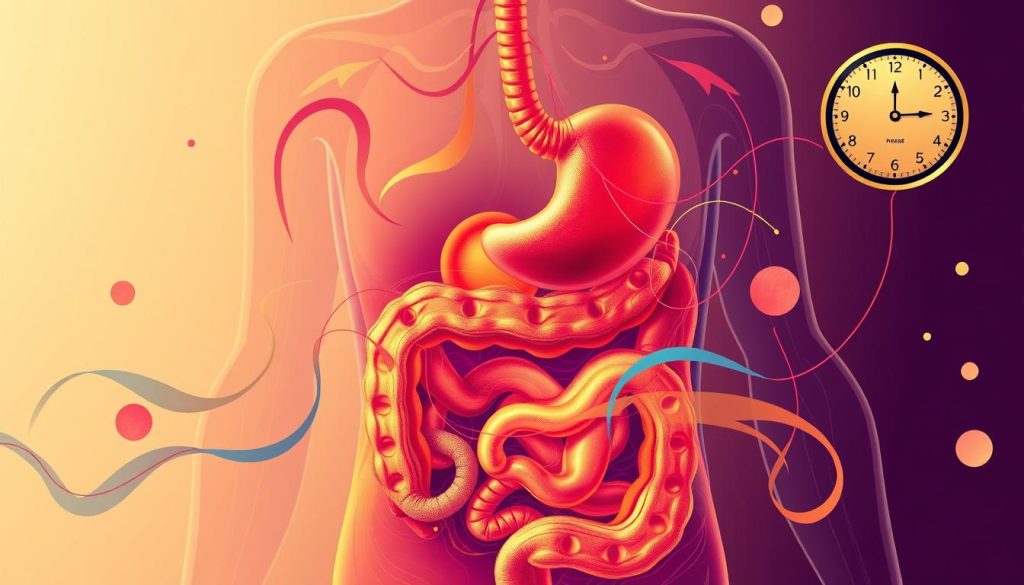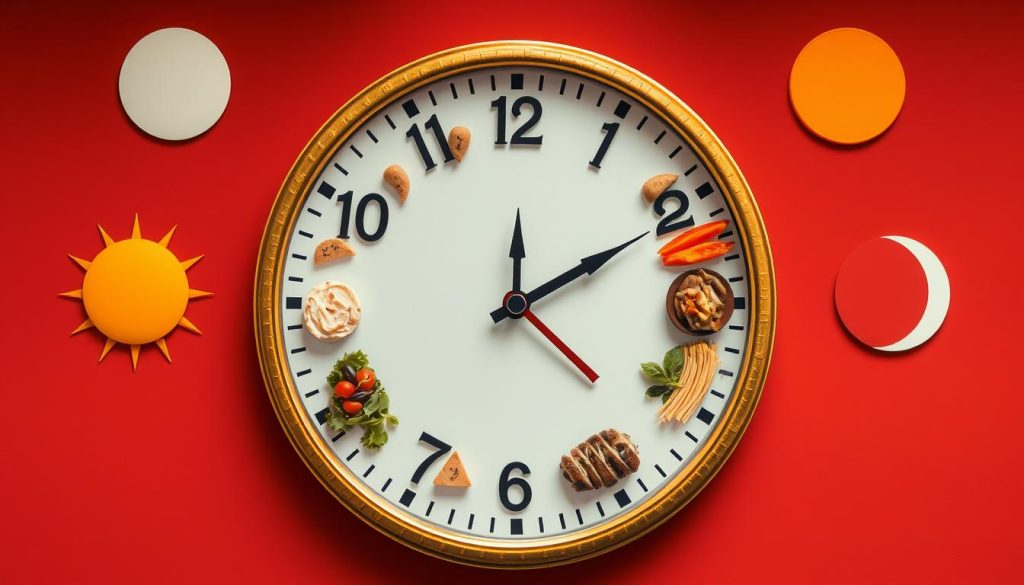Exploring the world of circadian rhythm and its impact on digestion is fascinating. Our bodies have daily rhythms that affect everything, from sleep to what we eat. Knowing these rhythms is key to better health, especially for digestion.
In this article, we’ll see how eating at the right time can boost digestion. I’ll share my own experiences and tips to improve your digestive health. Let’s start this journey and learn how meal timing can lead to better digestion.
Understanding Circadian Rhythm
Circadian rhythms are our body’s internal clock. They help control many bodily functions. These rhythms work best when we follow a 24-hour cycle, influenced by light and dark.
This timing is key for our health and daily activities. It keeps our body in sync with the day.
What Is Circadian Rhythm?
Circadian rhythm is about changes in our body over a 24-hour cycle. It affects sleep, hormone release, and digestion. It’s not just about sleep.
Irregular sleep or too much screen time can mess with it. This can harm our health.
How Circadian Rhythm Affects Overall Health
Keeping a healthy circadian rhythm is important. It helps avoid obesity, diabetes, and digestive problems. When it’s off, our metabolism and digestion suffer.
A regular rhythm boosts our body’s functions. It leads to better health.
The Science Behind Digestion
Understanding how our bodies digest food is key to better gut health. Our digestive system is amazing, breaking down food, absorbing nutrients, and getting rid of waste. Each step is important, starting when we eat and ending in the large intestine.
The Digestive Process Explained
The journey of food through our digestive system has several key stages:
- Ingestion: We start by chewing food in our mouths.
- Digestion: Our saliva, stomach, and intestines break down food further with enzymes.
- Absorption: The small intestine absorbs nutrients, which then help our body function.
- Elimination: The large intestine gets rid of any food we can’t digest.
These stages depend on many factors, like what we eat, how much water we drink, and even our mood. Eating well can make our digestion better and improve our gut health.
Factors Influencing Digestion
Many things can affect how well we digest food. Knowing these can help us improve our gut health:
- Dietary Choices: Eating foods high in fiber helps digestion, but too much processed food can slow it down.
- Hydration: Drinking enough water helps dissolve nutrients and waste, making digestion easier.
- Physical Activity: Being active helps our body digest food better, making it more efficient.
- Stress Levels: Too much stress can upset our digestion. Relaxation techniques are important for our digestive health.

By paying attention to these factors, I can improve my digestion and overall gut health. Knowing how my lifestyle affects digestion helps me make better choices for a healthier life.
Circadian Rhythm and Digestion
The timing of meals is key for good digestion. Our body’s natural rhythm affects how we digest and absorb nutrients. Knowing this can help us stay healthy and feel better overall.
The Impact of Timing on Digestive Health
Eating when our body wants to can make digestion better. When I eat with my body’s rhythm, I feel more energetic and my digestion improves. This connection helps us absorb nutrients well and keeps our gut healthy.
Research Supporting the Connection
Research shows that eating at the wrong times can harm our health. A study at Harvard Medical School found that eating late at night can mess with how we handle sugar and fat. This shows how important it is to eat at the right times for our health.

| Study | Key Findings |
|---|---|
| Harvard Medical School | Late-night eating disrupts glucose metabolism, impacting metabolic health. |
| UC San Diego | Meal timing influences weight management and nutrient absorption efficiency. |
| University of Surrey | Following a meal schedule aligned with circadian rhythms supports gut health. |
Aligning Eating Habits with Circadian Rhythm
It’s key to match our eating with our body’s natural rhythm for better digestion. By picking the right times to eat and choosing the right foods, we can boost our digestive health. Here, I’ll explore the best eating times and share tips for better digestion.
Best Times to Eat for Optimal Digestion
Studies show that some times of the day are better for digestion. Here’s a schedule for the best meal times:
| Meal | Recommended Time | Benefits |
|---|---|---|
| Breakfast | 7:00 AM – 9:00 AM | Kickstarts metabolism, essential to fuel the day |
| Lunch | 12:00 PM – 2:00 PM | Supports energy levels for afternoon activities |
| Dinner | 6:00 PM – 8:00 PM | Provides nourishment while allowing for digestion before bed |
Meal Timing Strategies to Enhance Digestion
Using smart digestive strategies can make digestion better and improve health. Here are some tips I’ve found helpful:
- Eat meals at regular times to avoid overloading your digestive system.
- Stay away from eating too close to bedtime to keep your body’s rhythm.
- Eat only when you’re really hungry to help with mindful eating.
- Make sure to have a balanced breakfast every day to help start digestion right.

Practical Tips to Improve Digestion
Improving digestion often starts with a structured approach to eating. By adopting healthy eating habits, we support our body’s natural rhythms. This promotes overall well-being. Here are some practical tips to enhance digestion effectively.
Creating a Healthy Eating Schedule
Establishing a consistent eating schedule is crucial for improving digestion. I recommend trying to eat meals at the same time each day. This helps the body predict when food will be available, optimizing the digestive process.
For instance, having breakfast, lunch, and dinner at regular intervals creates a routine that benefits digestive health. Here’s a sample eating schedule:
| Meal | Time |
|---|---|
| Breakfast | 7:00 AM |
| Lunch | 12:00 PM |
| Dinner | 6:00 PM |
Incorporating Mindfulness in Eating
Mindful eating is another effective strategy to improve digestion. Slowing down during meals allows the body to properly process food. It also enhances the enjoyment of eating. I often practice the following techniques:
- Focus on the meal without distractions such as TV or smartphones.
- Chew food thoroughly before swallowing to aid in digestion.
- Pause between bites to savor the flavors and textures of the food.
- Pay attention to hunger and fullness cues, which can help prevent overeating.
By creating a healthy eating schedule and embracing mindful eating, anyone can take significant steps to improve digestion. Engaging fully in the eating experience enriches not just our bodies but also our minds.
Personal Experiences with Circadian Rhythm and Digestion
My journey with digestion changed when I started eating with my body’s natural rhythm. I used to feel digestive discomfort sometimes. But, I found out it was because of when I ate.
By listening to my body’s internal clock, I noticed a big difference. Eating big meals in the day made me feel better. It was like my body and I were in sync, improving my digestion and energy.
This experience made me think about my eating habits and lifestyle. I want you to think about your digestion too. Maybe eating at the right time can make you feel better. Small changes can make a big difference in your health.

